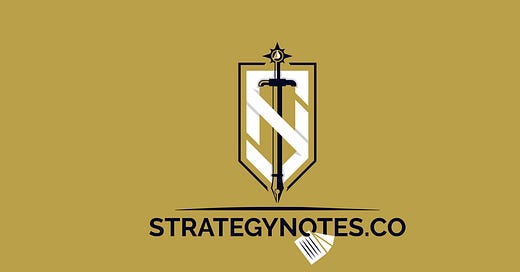The 2006 film, The Prestige, begins with a two minute monologue by Sir Michael Caine. He describes the structure of a magic trick:
“Every magic trick consists of three parts, or acts.
First part is called ‘The Pledge.’ The magician shows you something ordinary. A deck of cards, a bird, or a man.
He shows you this object, perhaps he asks you to inspect it. To see that it is indeed real, and ordinary, normal. But of course, it probably isn’t.
The second act is called ‘The Turn.’ The magician takes the ordinary something, and makes it do something extraordinary.
Now you’re looking for the secret, but you won’t find it. Because of course, you’re not really looking, you don’t really want to know. You want to be fooled.
But you wouldn’t clap yet. Because making something disappear isn’t enough. You have to bring it back.
That’s why every magic trick has a third act. The hardest part.
The part we call ‘The Prestige.’”
When strategy’s superior, and succeeds, it is a little like magic, isn’t it?
It’s built in to the way we describe it. Lawrence Freedman’s called strategy the “art of creating power,” which seems about as magic as it gets. Or, to paraphrase Arthur C. Clarke, every sufficiently advanced strategy is indistinguishable from magic.
Why?
Strategy’s like magic in several ways.
Ordinary becomes extraordinary. The world was on a path and some invisible force intervened to push it down another.
It seems miraculous when you see it happen.
Underneath it all, it’s really real.
It’s done in public view, but without the audience’s full comprehension.
It’s worth noting that the screenwriter holding the pen on the monologue above—Jonathan Nolan—has said he “made all that stuff up,” that there’s “no magic history” in the real world that suggests a three-act magic trick structure. Nolan made The Pledge, Turn, and Prestige up. Just like every strategy’s made up by someone.
Of course, strategy and magic differ in a couple ways.
Both are team sports, but magic’s is usually a smaller side.
Magic’s impact is limited to the trick’s audience itself, succeeds/fails in the moment, and likely carries few echoes far beyond. Strategy, success or failure, has a greater impact on the wider world. The stakes are higher.
In The Prestige, we’re treated to an obsessive competition between two rival magicians. Each charts a different strategy. One goes the effort route (Christian Bale as Alfred Borden), looking within himself for strength, and chooses self-sacrifice to achieve the impossible. The other looks outside himself (Hugh Jackman as Robert Angier), to learn from others through study to gain insights he never would have found on his own. For him, his success strategy is to gain by learning.
Both routes, sacrifice and study, are viable. They’re both hard, which is yet another characteristic strategy and magic share.
For some, the word “magic” can be used to indicate something easy, quick, no work involved. As in, “that app works like magic, just press a button and, ‘presto,’ in 20 minutes I have a pizza.” Considering how often we throw around the term “strategy,” a similar easy-sensibility applies.
The reality couldn’t be more different. Strategy and magic are hard. It takes loads of work and thought and research and sacrifice to make something so difficult into something that looks so easy.
Because to change the world, or truly stupefy someone—that really is the magic of strategy.




